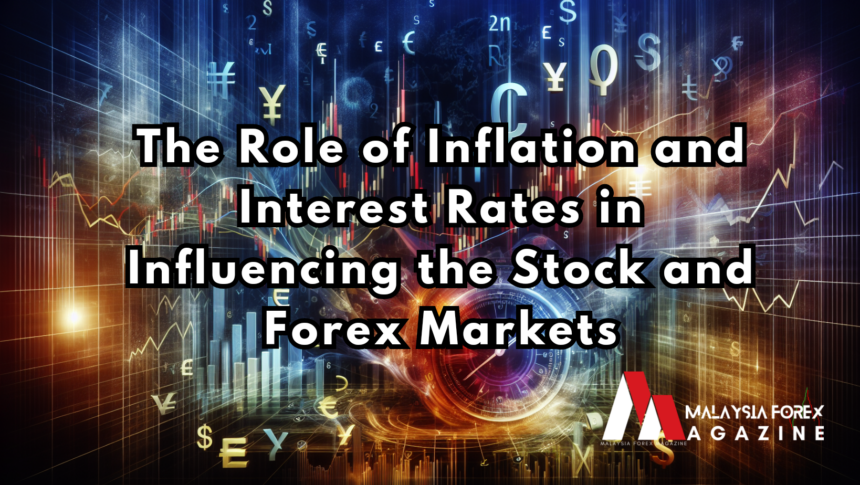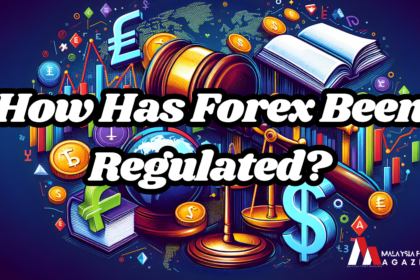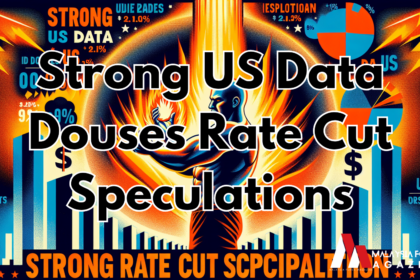Inflation and interest rates are two of the most critical factors that significantly affect the stock and forex markets. Both indicators provide valuable insights into the economic health of a country and influence the decisions of traders and investors. Understanding how inflation and interest rates work and their relationship with financial markets is essential for anyone involved in trading stocks or currencies.
What is Inflation?
Inflation refers to the rate at which the general level of prices for goods and services rises, leading to a decline in purchasing power. In simpler terms, inflation means that over time, the money you have can buy less. While moderate inflation is a sign of a growing economy, high inflation can lead to instability in financial markets and erode consumer confidence.
Inflation is usually measured using indices such as the Consumer Price Index (CPI) and the Producer Price Index (PPI). These indicators track the price changes of a basket of goods and services, giving a snapshot of inflationary pressures within an economy.
The Impact of Inflation on the Stock Market
Inflation affects the stock market in various ways, depending on its level and the response of monetary authorities, such as central banks.
- Rising Costs for Companies
When inflation rises, the cost of raw materials, labor, and other inputs also increases. This can lead to a reduction in corporate profits, especially if companies are unable to pass these higher costs on to consumers. Lower profits can cause stock prices to fall, especially for companies in industries that are sensitive to input costs, such as manufacturing and consumer goods. - Reduced Consumer Spending
High inflation reduces the purchasing power of consumers, meaning they can buy fewer goods and services with the same amount of money. Reduced consumer demand can lead to slower revenue growth for companies, further depressing stock prices, particularly in sectors like retail and hospitality. - Market Volatility
Inflation can lead to increased market volatility, as traders and investors speculate about the future course of monetary policy. If inflation is expected to rise sharply, markets may become nervous about potential interest rate hikes, leading to sudden swings in stock prices. - Impact on Dividends
For dividend-paying stocks, inflation can reduce the real return on investment. Even if a company continues to pay the same amount in dividends, the value of that dividend in terms of purchasing power will decline as inflation rises, making such stocks less attractive to investors seeking income.
The Role of Interest Rates
Interest rates, particularly those set by central banks like the Federal Reserve in the U.S. or the European Central Bank (ECB), play a crucial role in shaping financial markets. Interest rates are used to control inflation, influence economic growth, and maintain overall financial stability.
When inflation starts rising, central banks often raise interest rates to control it. Conversely, when inflation is low or the economy is slowing down, central banks may cut interest rates to encourage borrowing and spending.
The Impact of Interest Rates on the Stock Market
- Cost of Borrowing
When interest rates rise, borrowing costs increase for both consumers and businesses. Higher interest rates make loans more expensive, reducing consumer spending and business investment. Companies may also face higher costs when financing operations or expansion, leading to lower profit margins and, consequently, lower stock prices. - Valuation of Stocks
Interest rates directly affect the valuation of stocks. Higher interest rates make bonds and other fixed-income securities more attractive because they offer better returns with lower risk compared to stocks. This shift in investment preference can lead to a drop in stock prices as investors move their capital to safer, income-generating assets. - Sector-Specific Impacts
Interest rate changes can have varying effects on different sectors. For example, banks and financial institutions may benefit from higher interest rates because they can charge more for loans. On the other hand, sectors like real estate and utilities, which rely heavily on borrowing, may see a decline in stock prices as higher interest rates increase their costs.
The Impact of Inflation and Interest Rates on the Forex Market
In the forex market, currencies are often affected by inflation and interest rate differentials between countries. A country’s inflation rate and its central bank’s monetary policy can have a significant impact on the value of its currency relative to others.
- Currency Depreciation Due to Inflation
When a country experiences high inflation, the purchasing power of its currency decreases. This makes the currency less attractive to foreign investors, leading to a depreciation in its value. For example, if the inflation rate in the U.S. rises sharply compared to other countries, the value of the U.S. dollar may fall against currencies like the euro or the yen. - Interest Rate Differentials
Traders in the forex market closely watch the interest rates set by central banks. If a country raises its interest rates to combat inflation, its currency may strengthen, as higher interest rates attract foreign investment looking for better returns. Conversely, if a country lowers interest rates, its currency may weaken due to reduced demand from foreign investors. - Carry Trade Opportunities
The carry trade is a popular forex strategy that involves borrowing in a currency with low interest rates and investing in a currency with higher interest rates. When interest rate differentials between countries widen, traders may take advantage of these differences to profit from the interest rate spread. However, sudden changes in inflation or interest rates can disrupt carry trades and lead to volatility in the forex market. - Impact on Export and Import Prices
Inflation and interest rates also affect a country’s trade balance. A stronger currency, driven by higher interest rates, makes exports more expensive and imports cheaper. This can lead to a decline in export competitiveness, negatively impacting industries that rely on international sales. On the other hand, a weaker currency can boost exports by making goods cheaper for foreign buyers, though it may also increase the cost of imports.
Conclusion
Inflation and interest rates are critical factors that influence both the stock and forex markets. Traders and investors need to monitor these indicators closely, as changes in inflation and interest rate policies can lead to significant shifts in market dynamics. While inflation erodes purchasing power and can reduce company profits, interest rates affect borrowing costs, investment decisions, and the attractiveness of different asset classes.
By understanding the role of inflation and interest rates, traders can make more informed decisions and develop strategies that account for the potential risks and opportunities arising from changes in these economic indicators.











